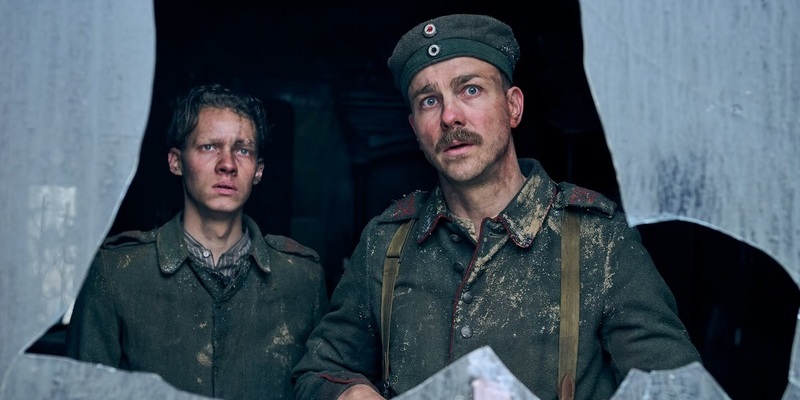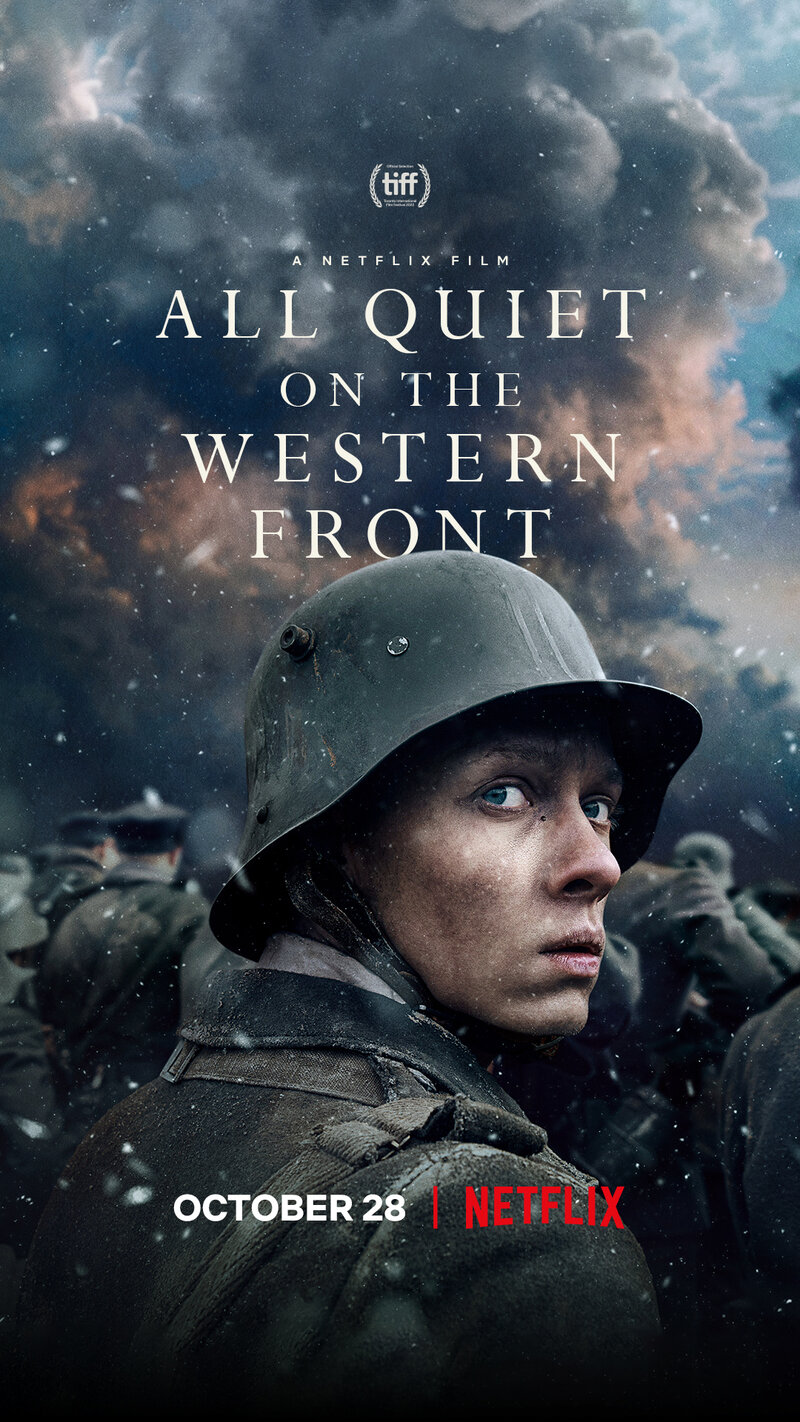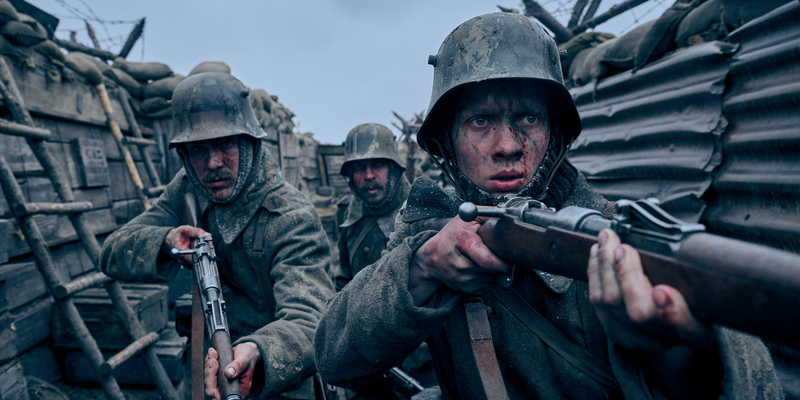
Review by
Eric Hillis
Directed by: Edward Berger
Starring: Felix Kammerer, Albrecht Schuch, Aaron Hilmer, Moritz Klaus, Edin Hasanovic, Adrian
Grünewald, Thibault De Montalembert, Daniel Brühl, Devid Striesow

The German film industry has famously shied away from producing films about
the two great 20th century conflicts the country initiated, so it's a
surprise to find such a large scale adaptation of Erich Maria Remarque's 1929 novel All Quiet on the Western Front coming from
Germany. Of course, Remarque's story is considered the greatest anti-war
text of all time, but as Truffaut famously put it, "There’s no such thing as
an anti-war film." What Truffaut meant was that whatever the intentions of
the filmmaker, narrative cinema will inevitably put us in a position where
we have to take a side. He was also referring to the exhilaration we
experience watching battle scenes, no matter how bloody and realistic.
I was never quite sure if I agreed with Truffaut until I watched director
Edward Berger's new take on the Remarque story. Everything Truffaut
warned of is present here. Yes, it's an unreservedly anti-war film, but it's
one that puts us in the position of rooting for a protagonist who is an
instrument of war, and with action scenes that wipe the floor with anything
to come out of Hollywood in recent times, it's at times an awe-inspiring
depiction of conflict.

In an opening that recalls the life of a bullet sequence that opened
Lord of War, we watch as a coat is taken from a dead German soldier on the frontline,
sent back to Germany where it is cleaned and restitched before it's recycled
and presented to our protagonist, Paul Baumer.
The naive 17-year-old German who finds himself sent to the titular
battlefield is played by newcomer Felix Kammerer in a quietly
devastating performance. Goaded by his friends, Paul enlists and, after a
rousing speech from a group of old men, he and his mates are packed off to
France with patriotic dreams of conquering Paris, screaming and fist-pumping
like football hooligans on an away day.
Any romantic notions of marching down the Champs-Élysées are quickly
dispelled when the young men find themselves stuck in a muddy,
rodent-infested trench. Taken under the wing of an older soldier, Kat (Albrecht Schuch), Paul learns the ropes of how best to survive, watching as his friends
fall around him. There are moments of calm, in which Paul and Kat raid the
hen houses of local farmers and receive letters from home, contrasted with
battles that usually begin with rumbling bass, like the entrance of a T-Rex
in a Jurassic Park movie.

That's not the only reference to blockbuster cinema. The movie's standout
sequence, an assault on the trench by French tanks, is clearly inspired by
the attack on Hoth sequence from The Empire Strikes Back. Negotiations in a lavish train carriage are straight out of
Once Upon a Time in the West. Volker Bertelmann's sparse score is centred on a loud horn
that recalls the sound of the invading aliens in Spielberg's
War of the Worlds. The emaciated landscape has the look of a post-apocalyptic zombie
movie.
It's perhaps the latter influence that is most prevalent. From zombie
movies Berger takes the idea that no matter how battle-hardened you become,
at some point you'll let your guard down - there's one particular death that
is truly heart-breaking in how avoidable it could have been. Paul is
something of a zombie himself. We watch as he goes from bright-eyed
enthusiasm to a sleepwalking weapon of war, and by the end of the film his
mud-caked face resembles that of the undead antagonists of a Fulci film (the
fog-shrouded frontline also has the appearance of the depiction of Hell from
Fulci's The Beyond).

War has rarely been depicted as so hellish, but in sequences like the
aforementioned nod to Star Wars, it's undeniably exciting. In the middle of this immaculately constructed
set-piece it suddenly occurred to me that the film had coerced me into
rooting for the Germans. This is down to how the film embeds us with Paul,
who may shed his patriotism early on but is a tool of German aggression
regardless. We want this young man to survive, which means we find ourselves
in the uncomfortable position of rooting for him as he kills French soldiers
who are equally young and naive. At one point Paul tries to quietly choke a
French soldier so as not to have his location compromised. It's as gruelling
a depiction of the difficulty of committing murder as the infamous farmhouse
sequence from Hitchcock's Torn Curtain, yet we want Paul to kill this man. It's only later, as the man is dying
and Paul has an attack of remorse, that we realise how the film has
manipulated us. At first I found this problematic, but having mulled over it
since my viewing I've come to realise it's actually a feature not a flaw, a
brilliant way of making us understand how and why young men and Paul end up
committing mass murder in the name of patriotism. What I still find
problematic however is how the film paints the French as one-note villains
and shows them inflicting the sort of cruelty (in one horrific sequence,
surrendering Germans are burnt alive) we never see from the Germans.
Berger has departed from the original novel in two key ways. One is by
excising the section where Paul gets to go home on leave. This means the
film is a lot less didactic than previous versions, as we never see any
explicit discussions of the morality of the war. The second departure is in
a second timeline focussed on the peace negotiations at the war's climax.
This often feels a little heavy-handed, crudely juxtaposing the starving men
in the trenches with generals and politicians feasting on fine food and
slurping wine, and Berger employs hindsight unavailable to Remarque by
suggesting that Germany's surrender would give rise to Hitler. The two
timelines collide in a climax that's a little too far-fetched, but one which
certainly underlines the film's message of the manipulation of young men by
their power-hungry elders.

All Quiet on the Western Front is on Netflix now.

